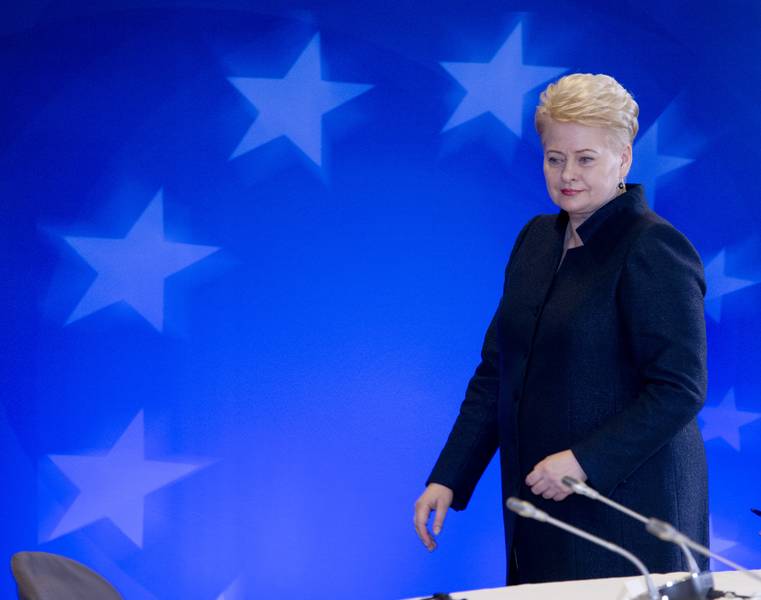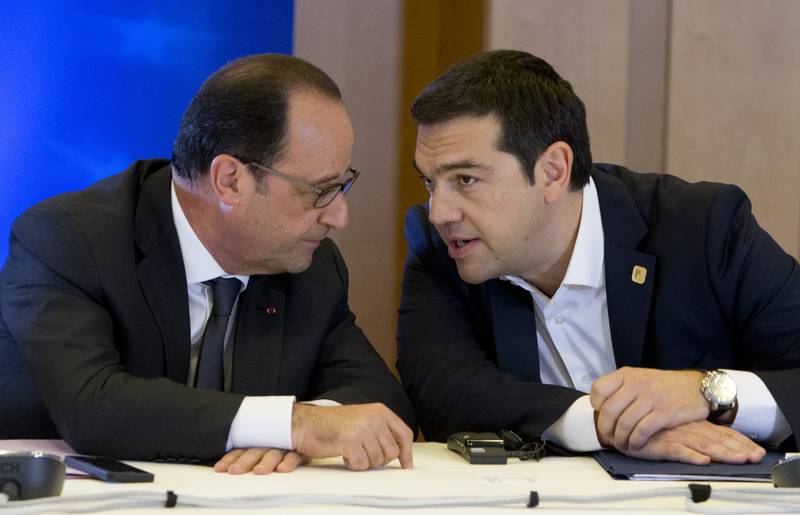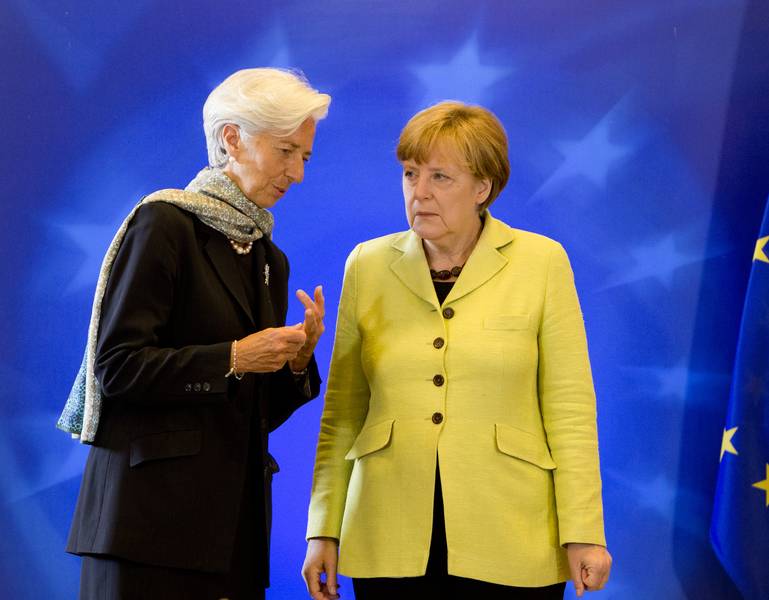Greece – a Never Ending Story
Adelina Marini, June 25, 2015
 The biggest piece of news that came from the emergency summit of the Eurozone countries is that Greece has finally managed to submit something like a proposal, something that was expected of them for four months, ever since the decision to extend the current bailout program by four months – by end June. During all these months the Greek government has been trying to wage an ideological battle with its partners/opponents in the EU while its time and money were draining away. Dozens of Eurogroup meetings, statements, and a number of articles from Greek Minister of Finance Yanis Varoufakis with no visible perspective of all this ever coming to an end. Until Thursday afternoon, when the president of the European Council Donald Tusk called an emergency summit of the countries, sharing the common currency.
The biggest piece of news that came from the emergency summit of the Eurozone countries is that Greece has finally managed to submit something like a proposal, something that was expected of them for four months, ever since the decision to extend the current bailout program by four months – by end June. During all these months the Greek government has been trying to wage an ideological battle with its partners/opponents in the EU while its time and money were draining away. Dozens of Eurogroup meetings, statements, and a number of articles from Greek Minister of Finance Yanis Varoufakis with no visible perspective of all this ever coming to an end. Until Thursday afternoon, when the president of the European Council Donald Tusk called an emergency summit of the countries, sharing the common currency.
After calling the meeting the ex-Prime Minister of Poland published a video address, practically giving Greece an ultimatum. “We are close to the point where the Greek government will have to choose between accepting what I believe is a good offer of continued support or to head toward default. At the end of the day, this is and can only be a Greek decision and a Greek responsibility”, said Mr Tusk
From “Hosanna” to “Crucify him” or from GRexit to GRemain
Clearly the ultimatum worked for late on Sunday reports started to leak that the Greeks were busy preparing an offer. In the early hours of Monday it turned out there has been a mistake – the Greeks had sent the wrong offer around midnight. There were few that showed understanding, saying it could happen to anyone to send the wrong document at the last minute under a great deal of stress. Regardless, there was a sharp mood swing come Monday morning. Nobody was talking of GRexit anymore. Positive messages started coming from the Commission that finally there was a basis for negotiations, an agreement is at arm’s length, and the crisis is finally at an end. All of this optimism evaporated at midday when Eurozone finance ministers started arriving in Brussels to prepare the summit starting several hours later.
Most were pessimistic and had quite low expectations, mainly due to the short time for review of the new offer. Irish Finance Minister Michael Noonan, clearly not impressed by his colleague Varoufakis’s consecutive emotional article aimed at the Irish audience and published in The Irish Times over the weekend, clarified that he had low expectations exactly due to the confusion of proposal versions. Everyone was cautious towards the contents, some glad there was a proposal at all, but everyone agreed it needed to pass through the technical team first, before handed to the ministers for discussion. Eurogroup boss Jeroen Dijsselbloem at least was optimistic that the new proposal looked like the thing that was expected of Greece for so long.
The mood of waiting and uncertainty held through into the meeting of the leaders, who convened at 7 pm CET on Monday. What is more, many of them showed irritation. Most annoyed was the Prime Minister of Finland, whose predecessor, now finance minister, Alexander Stubb said straight forward before the start of the Monday Eurogroup that they were all just flying some unnecessary air miles. Prime Minister Juha Sipilä was right in line with his minister’s mood in declaring he did not expect much. The acting chairman of Eurozone meetings Donald Tusk was once more stern and restrained by urging that “this political gamble” came to an end. The summit continued a little longer than expected considering the preceding moods and ended with a somewhat expected result – Greece was given another chance.
 Everyone was unanimous that work would continue round the clock so that what Greece presented could be formulated in a proper shape and accompanied by a relevant political commitment, for the institutions view is that although Athens’ proposition is quite thorough and precise it still lacks a list of necessary reforms and corresponding deadlines. Feelings were mixed after the Monday evening meeting. Some leaders remained frustrated and even refused to comment. Among them was Italian Prime Minister Matteo Renzi who exited the meeting only saying that work continued. IMF boss Christine Lagarde stated that there was a lot of work and not much time.
Everyone was unanimous that work would continue round the clock so that what Greece presented could be formulated in a proper shape and accompanied by a relevant political commitment, for the institutions view is that although Athens’ proposition is quite thorough and precise it still lacks a list of necessary reforms and corresponding deadlines. Feelings were mixed after the Monday evening meeting. Some leaders remained frustrated and even refused to comment. Among them was Italian Prime Minister Matteo Renzi who exited the meeting only saying that work continued. IMF boss Christine Lagarde stated that there was a lot of work and not much time.
The leader of the EC Jean-Claude Juncker expressed his confidence that it would all end this week. Furthermore he stated this game had no overtimes. That got the media thinking for this virtually means a new extension of the already extended program could not be expected. Dutch finance minister and Eurogroup leader Jeroen Dijsselbloem hinted as much just recently. In that case it is obviously a matter of a longer-term agreement that must, however, have financial backing and be accordingly approved by Greek Parliament, and – if there are changes in financial parameters – by other parliaments as well. This is impossible to happen by the end of June when the current program’s term expires. The Commission and the Council did not manage to explain exactly what was going to happen. According to them, reaching an agreement is the important part, whereas how is it going to work can be thought about later. At the end of the day the foundation is what was agreed upon on February 20.
In it though it is stated that the four-month extension requires that a list of reforms is agreed upon by end April, leading to completing the fifth review of the program and accordingly to releasing the following tranches. Nobody expected back then that Greece would not have anything definite ready by end April, let alone end June. Experience teaches that it is not really necessary for Greece to have fulfilled what was agreed for the review of the program to be over but Eurogroup leader Jeroen Dijsselbloem repeatedly stressed over the last few months that Greece must not only present a list of reforms and deadlines but that list must be implemented before further funds were released. He incessantly repeated that the main problem was lack of trust.
It is obvious this cannot happen even in the most-optimistic scenario of reaching an agreement at the Eurogroup today. Furthermore, leaked details of the new Greek offer suggest it will be very difficult to accept in Greece itself, especially by the far-left SYRIZA majority. As Greece is expected to increase budget revenue to reach primary budget surplus (excluding debt interest payments) and the government stubbornly refuses to lower wages and pensions, the main focus is on increasing the tax burden. Fiscal measures amount to 8 billion euros with the largest portion being a 7.3 billion increase in taxes and social insurance according to EUobserver. VAT rate will be increased to 23%, keeping the differential rate on foodstuffs, electricity and medicine, but removing some regional benefits. A considerable increase in corporate tax rate is also provided.
Greece joins again
Many economists criticised the measures for being largely unproductive and voiced scepticism towards their feasibility. There is however a larger, much longer-term problem than saving a few euros in the budget. It is the large-scale institutional reform that should not only change the way the state functions, but Greek mentality as well. After the Eurogroup failure last week Greek Finance Minister Yanis Varoufakis admitted low tax revenue collection cannot be solved by increasing taxes but rather with battling tax evasion, informal economy and corruption. Those are continuous and painful battles, especially with lack of strong political will and support by taxpayers or tax evaders. There is at the  moment also lack of a strong European pressure mechanism similar to the mechanism for Bulgaria and Romania.
moment also lack of a strong European pressure mechanism similar to the mechanism for Bulgaria and Romania.
In that sense the stake now is not signing the next agreement to bring the next financial injection and so on to eternity. The stake is whether Greece will start its re-accession to the EU and the Eurozone all over again. Many measures, expected of the government, look like the ones candidate countries are working on at the moment. Among actions proposed by Mr Varoufakis last Thursday (with no concrete numbers and deadlines) are a large-scale privatisation program to continue to 2025, establishing an independent tax and customs body, judicial and civil procedure code reforms, liberalisation of the goods and services market, eliminating double charges, reform in public administration by introducing proper staff evaluation systems, reducing non-wage costs, fighting corruption, adopting a code of conduct for electronic and press media.
“Yes, colleagues, Greeks need to adjust further. We desperately need deep reforms. But, I urge you to take seriously under consideration this important difference between: reforms that attack parasitic, rent-seeking behaviour or inefficiencies, and parametric changes that jack up tax rates and reduce benefits to the weakest”, appealed Mr Varoufakis on the evening of June 18. A deeper consideration of his words shows Greece is looking towards a second accession. Whether it will first exit the Eurozone (and the EU) or do it parallel to its problematic membership is a question that must be decided soon. In the EC strategy for enlargement for this year there is something that holds very true for problem countries such as Greece: “A well prepared accession process ensures enlargement is not at the expense of the effectiveness of the Union.”
Patience towards Greece, however, as well as towards accepting unprepared countries is finished. Lithuanian President Dalia Grybauskaitė was, as usual, painfully straight forward. She reminded that a lot of countries had gone through huge difficult economic crises and made huge adjustments.
One of them was Lithuania itself, which made a consolidation of 12% of GDP. Some countries did it with outside help, some on their own. “Now what we're hearing is all the time 'give us more money. We're not able to do that or that'. It's about responsibility”, added Ms Grybauskaitė emphasising that nobody is going to do the Greeks’ work. They should do it themselves. A week ago ECB boss Mario Draghi reminded that all of this could be ended with a political decision in the Eurogroup. At 2000 hrs CET today the Eurozone ministers convened once more with the pledge to work all night if need be but come up with an agreement to be welcomed by the leaders of the member states tomorrow. Sources in the Council claim there will be no negotiations with Greece at the summit meeting. If there is a deal within the Eurogroup it will be welcomed by the leaders. At this stage nobody is in the mood to discuss  what will happen if there is no deal. Dalia Grybauskaitė thinks the Greeks are still not aware of the size of the disaster.
what will happen if there is no deal. Dalia Grybauskaitė thinks the Greeks are still not aware of the size of the disaster.
The trouble is it is turning more and more into a disaster for the Eurozone itself. If Greece receives the next shady deal in the name of Eurozone integrity it will turn into a permanent problem. Moreover, the longer this never ending story continues, the more demoralising it is to the ones that truly made great sacrifices to walk out of their own crises and paid a stiff price for staying in the Eurozone or entering the Eurozone if you will.
Translated by Stanimir Stoev
 Klaus Regling | © Council of the EU
Klaus Regling | © Council of the EU Mario Centeno | © Council of the EU
Mario Centeno | © Council of the EU Mario Centeno | © Council of the EU
Mario Centeno | © Council of the EU